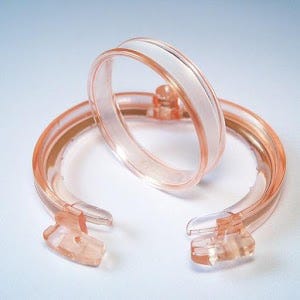Disposable, plastic device puts China on cutting edge of nonsurgical circumcision
If there is a fissure in the great wall of economic might that is China, it's the innovation deficit. It's a bit ironic that it has come to this in a country that invented papermaking and, for better or for worse, gunpowder. Of course, that was a few centuries ago, and, today, the Middle Kingdom has made its mark as the workplace of the world, not as a crucible of creativity.
June 19, 2015
If there is a fissure in the great wall of economic might that is China, it's the innovation deficit. It's a bit ironic that it has come to this in a country that invented papermaking and, for better or for worse, gunpowder. Of course, that was a few centuries ago, and, today, the Middle Kingdom has made its mark as the workplace of the world, not as a crucible of creativity. But, there is at least one area where Chinese companies have taken the lead, writes the Financial Times: Male circumcision.
 The single-use, disposable ShangRing, invented by Jian Zhong Shang and manufactured by Wuhu Snnda Medical Treatment Appliance Technology Co. (Wuhu, China), is designed to circumcise males over the age of 13 without surgery. The device consists of two concentric inner and outer plastic rings molded from Lexan polycarbonate—the inner ring is lined with silicone—that sandwich the foreskin of the penis, cutting off blood supply. Deprived of blood flow, the foreskin shrivels and falls off after several days.
The single-use, disposable ShangRing, invented by Jian Zhong Shang and manufactured by Wuhu Snnda Medical Treatment Appliance Technology Co. (Wuhu, China), is designed to circumcise males over the age of 13 without surgery. The device consists of two concentric inner and outer plastic rings molded from Lexan polycarbonate—the inner ring is lined with silicone—that sandwich the foreskin of the penis, cutting off blood supply. Deprived of blood flow, the foreskin shrivels and falls off after several days.
The device was granted a 510(k) by FDA in 2012 and received the CE mark in 2008, allowing it to be marketed in the European Union and other countries that recognize the marking. More recently, the World Health Organization (WHO) has prequalified the device, noting its utility for developing countries, where circumcision can help prevent HIV transmission. Trials conducted in African countries have shown that male circumcision reduces the risk of infection in men by 60%, says the organization.
Prequalification by the WHO signals to international organizations that a device may be used globally. More than one million devices reportedly have been sold in China.
The Bill and Melinda Gates Foundation has played a key role in funding clinical trials and pilot studies involving the ShangRing and has provided technical assistance in supporting WHO prequalification of the device, reports the FT.
A thumbs up from the WHO is "big news for China's medical companies, which are trying to build prowess at home and overseas," writes Laurie Burkitt in the Wall Street Journal. The Chinese healthcare market is projected to reach $113 billion by 2020, according to consultancy Bain & Co.
About the Author(s)
You May Also Like




